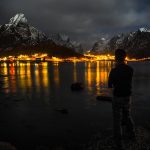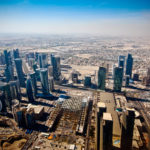Gay Life in St Vincent and the Grenadines follows close on the unhappy LGBT situation in nearby Grenada–it is illegal, stigmatized and not tolerated well by the locals. But, at least Grenada has one LGBT organization. St Vincent has none.
A Bad Situation and a Bad Law
Gay Life in St Vincent and the Grenadines follows close on the unhappy LGBT situation in nearby Grenada–it is illegal, stigmatized and not tolerated well by the locals. But, at least Grenada has one LGBT organization. St Vincent has none. There’s no dedicated place for LGBT citizens to go for support if one is young and gay 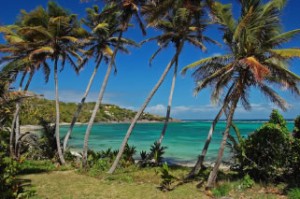 or coming-out in middle age. As a result, most LGBT people in St Vincent get married to opposite gender spouses and some of those live on the ‘down-low’ for secret pleasure and authentic affection.
or coming-out in middle age. As a result, most LGBT people in St Vincent get married to opposite gender spouses and some of those live on the ‘down-low’ for secret pleasure and authentic affection.
There is one ‘indirect’ agency, the Caribbean HIV/AIDS Alliance in Saint Vincent has successfully attempted to bridge the gap between HIV prevention and social support services for at-risk groups such as MSMs and sex workers. In many homophobic countries HIV work is often a legitimate cover for LGBT people to associate with one another within the purpose of HIV education and care.
But hanging over the work is the law that criminalizes consensual homosexual acts between adults in private. It was inherited from the British, whose Buggery Act and Offenses against the Person Act both predated the local legislation. In hollow self-justification, Saint Vincent and the Grenadines note the hundreds of years that it took for the United Kingdom to repeal similar legislation; “compared them to the relatively short period of time that Saint Vincent and the Grenadines has been an independent state, and the less punitive sanctions involved, we are ahead of Britain… In the context of the moral, societal and cultural makeup of the State, there is currently no desire to revisit that legislation.”
Despite the urging of the UN and numerous foreign countries the government of St Vincent continues to resist these recommendation saying that it “requires extensive national consultation given the nature of the issues involved.”
Bizarrely, the Government claims there are no discriminatory laws against gays, lesbian, bi-sexual and transgender people in Saint Vincent and the Grenadines as the constitution prohibits discrimination in all forms related to the enjoyment of people’s rights and freedoms.
In a written response UN Secretary General Ban Ki-moon recently stated: “No doubt deeply rooted cultural sensitivities can be aroused when we talk about sexual orientation. Social attitudes run deep and take time to change. But cultural considerations should not stand in the way of basic human rights.”
Some History and Geography
Saint Vincent and the Grenadines (SVG) is an island country in the Lesser Antilles chain, in the southern portion of the Windward Island, which doesn’t mean much to most people unless looking at a map (right). Caribbean link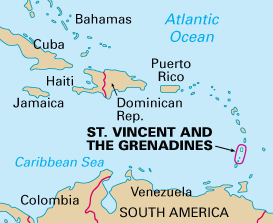
SVG has 389 km2 (150 sq mi) of territory consisting of the main island of Saint Vincent plus the northern two-thirds of the Grenadines islands (32 smaller islands) stretching south from DVG to Grenada (which owns the other one third of the Grenadines. The main island of Saint Vincent measures 18 km (11 mi) long, 11 km (6.8 mi) in width and is 344 km2 (133 sq mi) in area. The island is densely populated country with about 123,000 inhabitants. Its capital and main port is Kingstown.
For centuries it was called Hairouna (“The Land of the Blessed”) by the Carib natives. The Caribs resisted European settlement on Saint Vincent until 1719 when the brutal French arrived from Martinique. Previously, it was inhabited by escaped or shipwrecked slaves from Barbados, Saint Lucia and Grenada who sought refuge. Some intermarried with the Caribs and became known as Garifuna or Black Caribs.
This You Tube video offers a picturesque tour of the island’s beauty and charm mostly from a tourist perspective; nevertheless it is still a pretty place in the sun.
SVG Economy
St Vincent has a modestly busy tourist industry that draws at least 200,000 visitors a year, with half arriving on cruise ships. Of the 33 islands in this country only 10 have tourist infrastructure.
More than tourism, agriculture dominates with the export of bananas as it major product. Diverse other industries lag behind these two leading income sources and unemployment rate often remains over 14%. The risk of relying so much on a single crop is an obstacle to the islands’ commercial development. Bananas are vulnerable to tropical hurricanes which have more than once nearly wiped out wiped out large portions of crops over recent decades.
Personal Tourist Observations
“While one reads all about the more visited Caribbean destinations such as the Virgin Islands, Jamaica, the Caymans, and St. Martin, it’s often hard to find information about St. Vincent and the Grenadines, other than tourist appeals. One reason is that St. Vincent, a bountiful island with vast coconut and banana plantations, does not primarily depend on tourism as a source of income, and another is that the Grenadines are remote and can only be reached by yachts or commuter airlines. (photo left: musical festival)
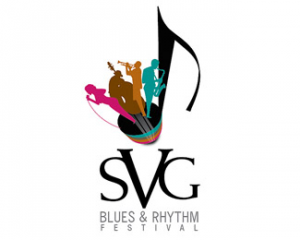 “St. Vincent is one of the most lush islands we’ve ever visited, somewhat like St. Lucia, but more spectacular in terms of rain forests, high mountains, deep valleys, and miles of dramatic shorelines. Every square inch seems covered in thick jungles or tropical farms, even steep hillsides. Rainfall is high, over 200” a year, so almost anything will thrive and grow fast.
“St. Vincent is one of the most lush islands we’ve ever visited, somewhat like St. Lucia, but more spectacular in terms of rain forests, high mountains, deep valleys, and miles of dramatic shorelines. Every square inch seems covered in thick jungles or tropical farms, even steep hillsides. Rainfall is high, over 200” a year, so almost anything will thrive and grow fast.
As one travels southward through the small Grenadine islands, the terrain changes. Steep mountains become rolling hills flowing down to gentle valleys, such as on Bequia, Mustique, and Petit St. Vincent. Rainfall is lower in the Grenadines, so while these small islands have lots of tropical vegetation, it is not as thick and is mixed with large grassy fields.”
Another Opinion
St. Vincent is often regarded as an island of mystery — far less travel information can be found than for many of the “touristy” islands such as the U.S. Virgins, St. Martin, and Barbados. The reason is simple — it has not yet been invaded by mobs of tourists, cruise ships, and T-shirt shops fortunately for those who seek a quiet vacation on an island full of natural beauty featuring spectacular mountains and valleys, cascading waterfalls, rivers, deep gorges, and miles of beaches.
There is lush vegetation since it is nearer the equator and has much higher rainfall than the Virgins. Unlike Tortola which has its main economy centered around tourism, St. Vincent’s primary economy is agriculture and fishing, with eco-tourism on the rise.
The popular film ‘Pirates of the Caribbean’ was filmed on the island revealing the islands beauty and name abroad. Two more sequels are planned here.
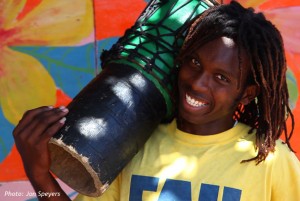 The construction of an international airport has been a political football for ten years and is yet to be built as a result of inter-party squabbling.
The construction of an international airport has been a political football for ten years and is yet to be built as a result of inter-party squabbling.
There is a small offshore financial sector whose restrictive secrecy laws have brought suspicion and increased scrutiny from the US. The natives of Bequia are permitted to hunt up to four Humpback Whales per year under internationally approved quotas. http://en.wikipedia.org/wiki/Saint_Vincent_and_the_Grenadines
Gay Life in St Vincent and The Grenadines
There is little public information or personal testimony about LGBT life on SVG. However, recently a brave gay male couple went public with their lives and published their story about living gay in the country.
“On September 4, 2011, this newspaper ‘Vinci Kallaloo’ published a short article from a man claiming to be homosexual. It was entitled ‘Introduction: Not Easy Being Gay in St. Vincent and the Grenadines’.
“That article attracted 3,488 hits in one day and over 50 comments from our readers in a relatively short space of time. Apart from our home page, only two other pages have generated more hits. Several of the responses posted were too incendiary to publish, even on a liberal site like ‘Vinci Kallaloo’. Indeed, several persons used the forum to issue violent threats to gays who they know and named on the site.
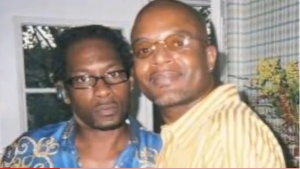 “Subsequently, we received a second article from the same source (photo left) entitled: ‘My Story: Not Easy Being Gay in St. Vincent and the Grenadines’ This time, he attempts to explain what led him to a life of homosexuality. However, given the backlash over the first article, we agonized over whether it should be posted or not. After extensive deliberation we have chosen to publish the piece in the interest of free speech and in accordance with our belief that every voice must be heard. Following the Introduction is ‘My story: Not Easy Being Gay in St. Vincent and the Grenadines'”.
“Subsequently, we received a second article from the same source (photo left) entitled: ‘My Story: Not Easy Being Gay in St. Vincent and the Grenadines’ This time, he attempts to explain what led him to a life of homosexuality. However, given the backlash over the first article, we agonized over whether it should be posted or not. After extensive deliberation we have chosen to publish the piece in the interest of free speech and in accordance with our belief that every voice must be heard. Following the Introduction is ‘My story: Not Easy Being Gay in St. Vincent and the Grenadines'”.
Introduction: Not Easy Being Gay in St. Vincent and the Grenadines
“I am gay and I am a Vincentian. Since I have discovered and accepted my sexuality, life has been extremely difficult for me and my partner of seven years. It is not at all easy for a so called “buller man” in a backward country like St. Vincent and the Grenadines.
I am an ordinary, decent and law abiding citizen. I am a hard working professional who pays his fair share of taxes and contributes positively to the development of this country. Yet, I am treated like an outcast all because of my sexual preference.
As a teenager my father spat on me; he kicked me out of his house and severed all ties with me when he heard that I was “bulling”. I must thank my grandmother for rescuing me from the streets. I have had to put up with taunting and name calling; I lived with threats and intimidation; I was treated like the lowest of the low for a situation I could not help at all. Thank God I survive! Not only that, I am liberated! I have shed the guilt and shame that burdened me for years. I earn a good income doing a job I love and I have been in a committed relationship with one partner whom I love dearly for nearly seven years. My life is not perfect but it’s getting there. If you allow me, I would like to use this blog to share with the world, my experiences as a “buller man” in St. Vincent and the Grenadines. (Read the 56 responses to this report; a little over half are homophobic, the others tolerant.)
My Story: Not Easy Being Gay in St. Vincent and the Grenadines
“Back when I was a student in Grammar School in the 1970s, they did not have any tolerance for people who turned into homosexuals, or decide to “bull”. No one encouraged me; I was not abused by any relative or teacher; I did not even know that men had sex with men in my community. So I’ve been puzzling over the notion of why I chose to be gay. Especially since I didn’t even know what “being gay” was. I didn’t even have the word “homosexual” in my vocabulary. As I grew up I heard about bulling and I knew it was nasty.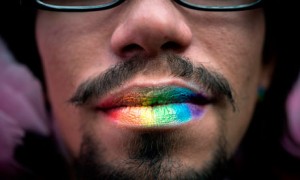
“I became a Christian once. I went to church. It was crystal clear that my church did not tolerate anyone who was gay. Yet, I’ve been trying to figure out exactly what it was that made me make this ‘choice’ especially in the face of such hatred when it came to guys calling other guys “cock suckers” and “queers,” “bullers” and “batty man”. I guess I wanted to be hated and despised as well. What normal, heterosexual teen male wouldn’t give up acceptance and privilege to become a member of a hated group?
“Believe me, when I say that I was a cute teenager, and girls were interested in me. So maybe I was tired of being a popular guy who had girls asking me out on dates, and at one point having to decide which of two girls I was going to take to a party. At one point, I was tired of having girls have crushes on me. And assuming that we’re all born heterosexual, and because we’re certainly all raised to think in terms of heterosexuality as the only possible “lifestyle,” I’m confused and puzzled as to just what it was that made me choose to suddenly become emotionally and physically attracted to boys, rather than girls.
“I went out a lot. Never wanted for girls. So it wasn’t a lack of self-esteem in that department. Nonetheless, I just suddenly chose to be attracted to a few boys I saw around school or had in my classes. I just suddenly got “all shook up” as Elvis Presley said whenever I saw these boys. My heart began to race, I felt like I was about to die of heartache whenever I was around them, and this choice to feel this way became stronger, no matter how many girls I went out with. And the oddest thing about all this is, I had no idea what was happening to me. I had never been approached by another guy for sex, and the only notion I had about “buller men” was that it was absolutely disgusting to be one. Yet I realized I liked boys and what I wanted to try with them. I wondered what it would feel like to kiss another boy (a particular boy), and what it would feel like to hold hands, and what it would feel like for him to feel the same way.
 “Now, how I chose to feel all this is still beyond me. But once I did finally figure out that “bulling” also meant “homosexual” and that there were places where men liked to go to meet other men, about the only thing I can say I chose to do was to carry through with my feelings and went with another man for the first time of my own free will when I was 21 years old. And, despite the hatred and revulsion from family and friends when I declared my hand, along with the ups and downs in my life and the periods when I pretend to behave in a heterosexual way, I’ve never doubted my inner gay soul since then. I am gay and I am no longer ashamed of it!
“Now, how I chose to feel all this is still beyond me. But once I did finally figure out that “bulling” also meant “homosexual” and that there were places where men liked to go to meet other men, about the only thing I can say I chose to do was to carry through with my feelings and went with another man for the first time of my own free will when I was 21 years old. And, despite the hatred and revulsion from family and friends when I declared my hand, along with the ups and downs in my life and the periods when I pretend to behave in a heterosexual way, I’ve never doubted my inner gay soul since then. I am gay and I am no longer ashamed of it!
“Is it time for this country to engage in a rational and civil discussion about the acceptability of homosexuality as a lifestyle. Should we continue to criminalize men having sex with men? There are hundreds, perhaps thousands of homosexuals, both males and females in our midst. Do they not qualify for the freedom to engage in their lifestyle without provocation?
Let the debate go on! (Read the 49 responses to this story; mostly homophobic.)
GlobalGayz Comments on this Story
This courageous author has written a sincere yet naive account of discovering his gayness. Unfortunately he uses the the word ‘choice’ frequently in a colloquial manner without realizing the precise meaning of the word. It is clear from his words that he did not really make a free choice to be gay; his sexual orientation emerged naturally from within and it caused him much confusion. His commentary does not reflect a sophisticated mind, rather he seems to be product of his culture in his simplistic and limited (yet kindly) understanding of human sexuality.
The many negative responses to his story from native Vincentians also reflect the narrow thinking that is common about this complex topic. Most responders have relied on simplistic, shallow, religious and unexamined opinions. It is easy to see how such confined understanding and expression about homosexuality among the populace has kept it illegal with virtually no ‘enlightened’ awareness of progressive thought from the outside–one of the ‘side-effects’ of being a somewhat isolated Caribbean island with limited touristic and commercial exposure.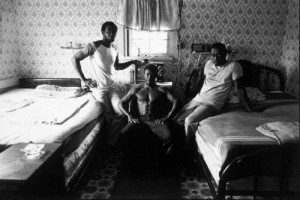
There are no LGBT groups or public activists in Saint Vincent and the Grenadines which publicly advocate for gay and lesbian rights other than the ‘quiet agenda’ of some of the HIV health outreach personnel who offer HIV support groups. As a result there is no moderating voice of reason when a ‘scandal’ hits town such as the political and social hysteria and victimization of two college lecturers that was rampant at the SVG Community College in 2011 when a rumor spread about their possible homosexual tendencies. A posting in the local newspaper accuses the homophobic college administrator of starting the rumor in order to fire the lecturers.
Compiled by Richard Ammon
GlobalGayz.com
September 2012
Google Photo Gallery for St Vincent and The Grenadines
Further reading:
http://www.unhcr.org/refworld/country,,,,VCT,4562d94e2,4b20f0422,0.html
Situation and treatment of homosexuals
http://pppministries.wordpress.com/category/current-affairs/homosexuality/
If St. Vincent and the Grenadines promotes gay tourism, we will be agreeing with the principles and immorality of the homosexual agenda.
http://www.state.gov/j/drl/rls/hrrpt/2010/wha/154519.htm
US Department of State HR Report: There were continued human rights problems in some areas, primarily impunity for police who used excessive force, poor prison conditions, an overburdened court system, violence against women, abuse of children, and discrimination against homosexual persons.
www2.ohchr.org/english/…/A.HRC.18.15.ADD.1_en.pdf
SVG Response to the UNHR Commission: The Government of Saint Vincent and the Grenadines hereby presents its responses to those recommendations that it had declared “would have required further consideration before the formal adoption of the Report” by the UN Human Rights Council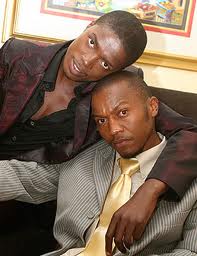
http://www.gaystarnews.com/article/queen-elizabeth-ii-celebrates-60-years-gay-rights020612
History of gay rights since 1950 in Brit Commonwealth
http://www.thebody.com/content/art48211.html
HIV in Caribbean
http://www.queertrip.com/gayandlesbianhoneymoon.php
LGBT honeymoons
http://hello-zen.com/un-reaffirms-protection-for-lgbt-right-to-lif
UN reaffirms protection for gays’ right to life. The Caribbean, St. Lucia excluded, falls in line.


